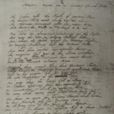創作背景
此詩創作長達8年之久,最初是為了哀悼他在伊頓公學讀書時的好友里查德 ·韋斯特,至少詩末所附的“墓志銘”是為他而作。但縱觀全詩,其內容已經明顯超越了對某個具體人物的哀思,而是通過對鄉村一處墓地的描寫,表達對下層默默無聞的人民的深切同情。對他們純樸善良品質的讚揚,為他們沒有機會施展天賦和才華而惋惜,同時也表現了對權貴、人間虛榮的蔑視和嘲諷,對大人物傲慢奢侈生活的譴責。
原文內容
The poem begins in a churchyard with a narrator who is describing his surroundings in vivid detail. The narrator emphasises both aural and visual sensations as he examines the area in relation to himself:
The curfew tolls the knell of parting day,
The lowing herd wind slowly o'er the lea
The ploughman homeward plods his weary way,
And leaves the world to darkness and to me.
Now fades the glimm'ring landscape on the sight,
And all the air a solemn stillness holds,
Save where the beetle wheels his droning flight,
And drowsy tinklings lull the distant folds;
Save that from yonder ivy-mantled tow'r
The moping owl does to the moon complain
Of such, as wand'ring near her secret bow'r,
Molest her ancient solitary reign. (lines 1–12)
As the poem continues, the narrator begins to focus less on the countryside and more on his immediate surroundings. His descriptions begin to move from sensations to his own thoughts about the dead. As the poem changes, the narrator begins to emphasise what is not present in the scene; he contrasts an obscure country life with a life that is remembered. This contemplation provokes the narrator's thoughts on waste that comes in nature:
Full many a gem of purest ray serene,
The dark unfathom'd caves of ocean bear:
Full many a flow'r is born to blush unseen,
And waste its sweetness on the desert air.
Some village-Hampden, that with dauntless breast
The little tyrant of his fields withstood;
Some mute inglorious Milton here may rest,
Some Cromwell guiltless of his country's blood.
The applause of listening senates to command,
The threats of pain and ruin to despise,
To scatter plenty o'er a smiling land,
And read their hist'ry in a nation's eyes,
Their lot forbade: nor circumscrib'd alone
Their growing virtues, but their crimes confin'd;
Forbade to wade through slaughter to a throne,
And shut the gates of mercy on mankind,
The struggling pangs of conscious truth to hide,
To quench the blushes of ingenuous shame,
Or heap the shrine of Luxury and Pride
With incense kindled at the Muse's flame. (lines 53–72)
The narrator focuses on the inequities that come from death, obscuring individuals, while he begins to resign himself to his own inevitable fate. As the poem ends, the narrator begins to deal with death in a direct manner as he discusses how humans desire to be remembered. As the narrator does so, the poem shifts and the first narrator is replaced by a second who describes the death of the first:
For thee, who mindful of th' unhonour'd Dead
Dost in these lines their artless tale relate;
If chance, by lonely contemplation led,
Some kindred spirit shall inquire thy fate,
Haply some hoary-headed swain may say,
Oft have we seen him at the peep of dawn
Brushing with hasty steps the dews away
To meet the sun upon the upland lawn. (lines 93–100)
The poem concludes with a description of the poet's grave, over which the narrator is meditating, together with a description of the end of the poet's life:
There at the foot of yonder nodding beech
That wreathes its old fantastic roots so high,
His listless length at noontide would he stretch,
And pore upon the brook that babbles by.
Hard by yon wood, now smiling as in scorn,
Mutt'ring his wayward fancies he would rove,
Now drooping, woeful wan, like one forlorn,
Or craz'd with care, or cross'd in hopeless love.
One morn I miss'd him on the custom'd hill,
Along the heath and near his fav'rite tree;
Another came; nor yet beside the rill,
Nor up the lawn, nor at the wood was he;
The next with dirges due in sad array
Slow thro' the church-way path we saw him borne.
Approach and read (for thou canst read) the lay,
Grav'd on the stone beneath yon aged thorn." (lines 101–116)
An epitaph is included after the conclusion of the poem. The epitaph reveals that the poet whose grave is the focus of the poem was unknown and obscure. The poet was separated from the other common people because he was unable to join with the common affairs of life, and circumstance kept him from becoming something greater:
Here rests his head upon the lap of Earth
A youth to Fortune and to Fame unknown.
Fair Science frown'd not on his humble birth,
And Melancholy mark'd him for her own.
Large was his bounty, and his soul sincere,
Heav'n did a recompense as largely send:
He gave to Mis'ry all he had, a tear,
He gain'd from Heav'n ('twas all he wish'd) a friend.
No farther seek his merits to disclose,
Or draw his frailties from their dread abode,
(There they alike in trembling hope repose)
The bosom of his Father and his God. (lines 117–128)
The original conclusion from the earlier version of the poem promotes the view that humans should be resigned to the fact that we will die, which differs from the indirect, third person description in the final version:
The thoughtless World to majesty may bow
Exalt the brave, & idolize Success
But more to Innocence their Safety owe
Than Power & Genius e'er conspired to bless
And thou, who mindful of the unhonour'd Dead
Dost in these Notes thy artless Tale relate
By Night & lonely contemplation led
To linger in the gloomy Walks of Fate
Hark how the sacred Calm, that broods around
Bids ev'ry fierce tumultous Passion ease
In still small Accents whisp'ring from the Ground
A grateful Earnest of eternal Peace
No more with Reason & thyself at strife;
Give anxious Cares & endless Wishes room
But thro' the cool sequester'd Vale of Life
Pursue the silent Tenour of thy Doom.
藝術特色
這首詩充分體現了格雷的民主思想。由於貧困,農民不能發揮自己的才能,不能成為像彌爾頓John Milton 那樣的文學家,像克倫威爾Oliver Cromwell 那樣的政治家。但是從另一方面說,在他們身上沒有“野心”,“傲慢”,“驕”“奢”和“諂媚”。他們雖然“貧瘠”,沒有知識,但卻有“德性”和“天良”,他們是自然本身。這樣的思想和瀰漫於全詩的感傷情調,使《墓園輓歌》Elegy Written in a Country Churchyard (1750) 成為18 世紀後期感傷主義詩歌的典範之作。

